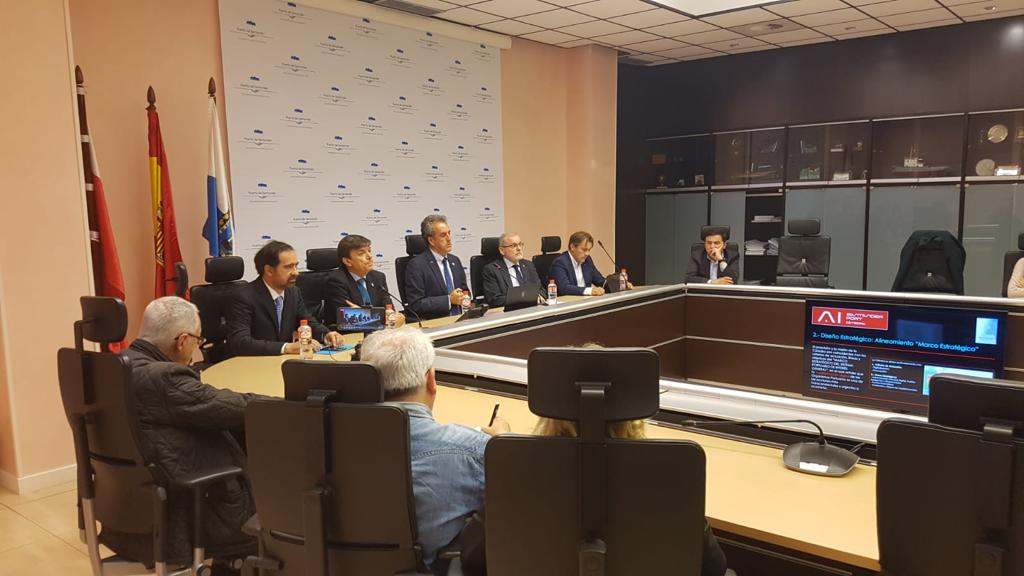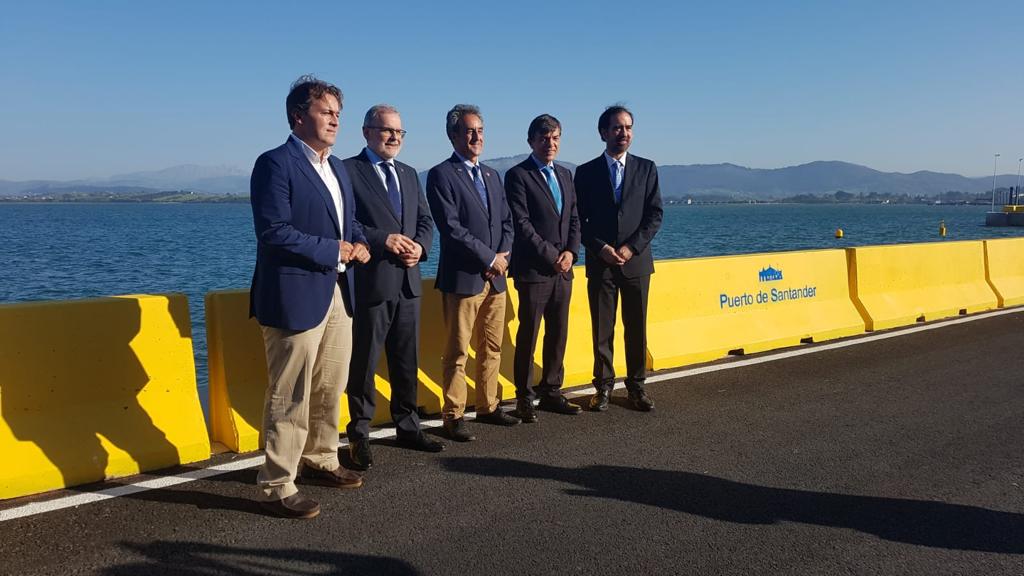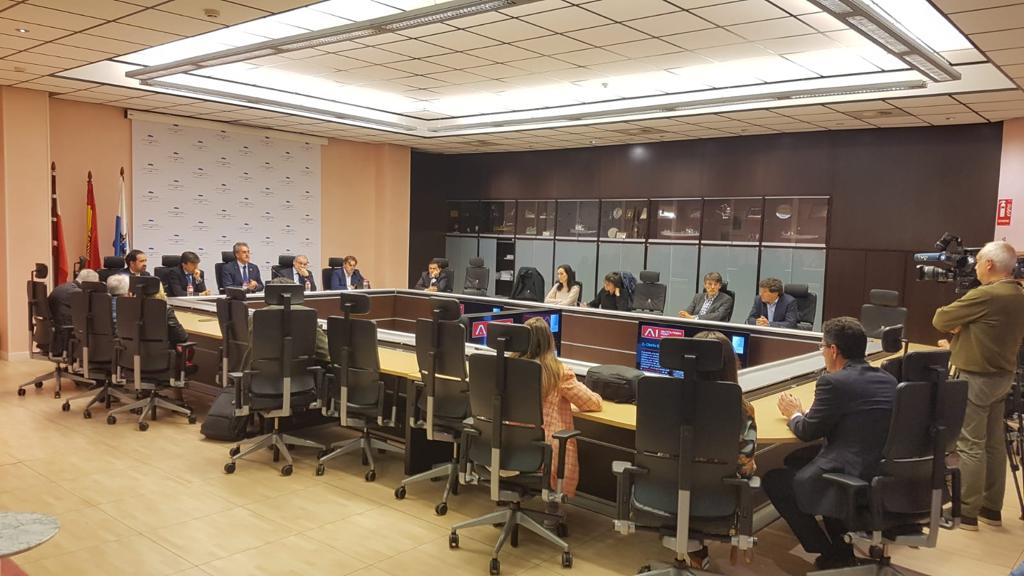NEWS
Presentation of the Institutional Chair in Artificial Intelligence Applied to Ports “AI Santander Port”.
This is an initiative of the Autoridad Portuaria de Santander (APS), the Universidad de Cantabria (UC), the Universidad Internacional Menéndez Pelayo (UIMP), the Fundación Instituto de Hidráulica Ambiental de Cantabria (FIHAC) and NextPort by Moffat & Nichol, which aims to respond to the modernization requirements of the port logistics sector.
Yesterday, at the headquarters of the APS, was presented the Institutional Chair in Artificial Intelligence Applied to Ports “AI Santander Port”, in an official ceremony attended by the president of the APS, Francisco Martín; the rector of the UC, Ángel Pazos; the rector of the UIMP, Carlos Andradas; the vice president of FIHAC, Raúl Medina and the founding partner and technical director of NextPort by Moffat & Nichol, Óscar Pernía.
This Institutional Chair is an intellectual capital management tool, with the purpose of promoting the use of Artificial Intelligence (AI) as a lever to boost and accelerate the digital transformation of ports in general, and that of Santander and its logistics community in particular. It will therefore act as a driving force for the transition of these infrastructures towards sustainable and competitive mobility.
The objective of this initiative is to promote the use of Artificial Intelligence (AI) and associated technologies in ports, especially in Santander, to boost their digital transformation, as well as to act as an engine for the transition of these infrastructures towards sustainable and competitive mobility. In the same vein, the Chair, the result of an agreement between the five entities, aims to position itself in 2026, the horizon of the term of the agreement, as an accredited national and international “knowledge operator” in the fields of training, research and application of AI and its associated technologies to the logistics-port sector.
Within its strategic design, the Chair’s mission will have two essential tasks. On the one hand, to act as a factory of ideas capable of analyzing the technological challenges of ports, generating debate, anticipating changes and proposing solutions and, on the other hand, to attract talent and provide it with the necessary knowledge, competencies and skills in AI to promote innovative actions in the port sector, devise solutions in the port value chain and successfully manage the implementation of AI in the port area and its logistics chains.
For the president of the APS, Francisco Martin, the development of this Chair is “essential for the future of the port and its proper transition towards its definitive conversion into a Smart Port” since, “although AI is now behind the automation of many port services and operations, there is still much to be done in these and other fields” such as environmental sustainability, energy transition or security. According to Martin, “this initiative places us as pioneers in knowledge management and research in AI applied to ports, which is a unique opportunity to position ourselves in a privileged place within the logistics sector”.
For Carlos Andradas, who is the rector of the UIMP, “this Chair is another step in the long history of collaboration between the UIMP and the Port of Santander. If we also add the presence of the University of Cantabria and the topic: A.I. applied to port management, the result is a project that excites and stimulates us all”. Andradas added that A.I. “is one of the technological advances that is changing and will change our society even more. From the academic institutions we have the obligation to be at the forefront in teaching and research in AI to ensure its use for the benefit of all”. “In our case, to improve and streamline port management and contribute to the Port of Santander gaining more and more importance and presence on the international scene,” concluded the rector of the UIMP.
Likewise, the rector of the University of Cantabria, Ángel Pazos, explained that the University of Cantabria is an “agent of knowledge with teaching, research and transfer functions”, so the role of this University will consist, on the one hand, “in being one of the agents with clear responsibility in terms of teaching activities such as courses or degrees that later have the necessary recognition” and, on the other hand, as a producer of science through the Institute of Physics of Cantabria, in “generating knowledge and transfer”.
FIHAC Vice President Raúl Medina has highlighted “the uniqueness of this initiative at national level, which responds to a clear social demand, under the triple helix model of innovation”. Thus, the collaboration between the public administration, through the Port Authority of Santander; the knowledge sector, represented by two universities and a research center specialized, among other sectors, in the management of intelligent ports; and the industry, through a highly internationalized company, “make the project a model of guaranteed success”.
NextPort by Moffatt & Nichol partner-founder and technical director, Óscar Pernía emphasized that “AI provides the capabilities that the Maritime-Port Industry needs to be more efficient, safe, sustainable and resilient, also responding to challenges such as climate change or the decarbonization of transport”. According to Pernía, “however, AI requires fundamental considerations regarding organizational schemes and the necessary training to enable its practical application, making it inclusive with People, who will continue to be key elements for the management of Change”, emphasizing the motivation of the Chair for the “generation and dissemination of knowledge in this regard, with a differential approach to create added value from public-private collaboration”. For Moffatt & Nichol this Chair means a fundamental investment for the future of our Group, to accelerate our efforts in our Artificial Intelligence product from Spain but with international reach.
The activities of the Chair, which will be based at FIHAC and Faro de la Cerda, will be divided into three lines of action: teaching, research, innovation and dissemination. Among others, we can highlight the teaching of our own degrees, collaboration with postgraduate programs oriented to doctoral programs, the organization of courses and conferences, the promotion of internships, the support of end-of-degree, expert specialist and master’s degree projects, and the publishing of publications.
One of its first actions will be the meeting “Do Ports Dream of Automatic Bots? Adoption and Use of Artificial Intelligence Technologies in Ports”, which will take place on September 6 at the UIMP.







